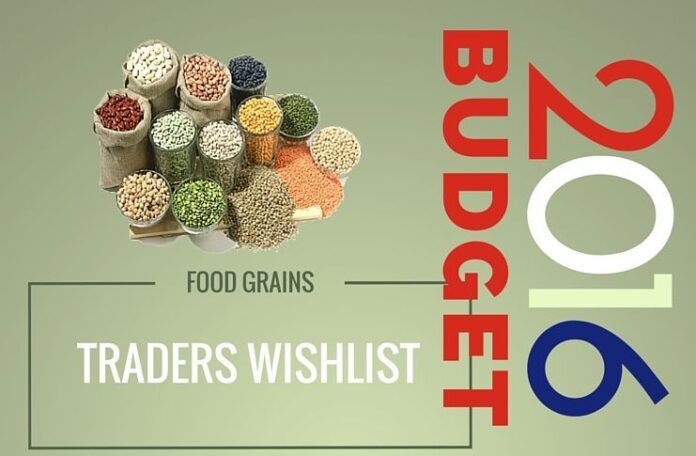
Budget 2016 – What Small scale Food grain traders are looking for
Budget 2016 – This is the first in a series of articles as we solicit views from different spheres of the Indian society.
[dropcap color=”#008040″ boxed=”yes” boxed_radius=”8px” class=”” id=””]T[/dropcap]he Indian wheat crop harvest is round the corner. Our finance minister is busy preparing his budget. Our Agriculture, Food & Public Distribution Ministry is working to achieve food security for the common man. What are the challenges they face? What are the immediate expectations of trade and industry?
In short abolishing import duty will ease procurement process of FCI.
Year 2015 saw a harvest of over 88 million tons. Un-seasonal rains affected quality of harvested grains. Harvested wheat did not meet procurement standards of Food Corporation of India (FCI) which had relaxed procurement norms to protect the farmer’s interest.
2015 saw FCI procuring 28+ million tons of harvested substandard wheat. Even with the relaxed norms wheat was fit for human consumption. However, procured wheat was unfit for long storage and best consumed quickly. FCI closed 2015 with 18+ million closing stocks. In all total stocks climbed to 46+ million tons post procurement.
[dropcap color=”#008040″ boxed=”yes” boxed_radius=”8px” class=”” id=””]I[/dropcap]nitially, FCI found it difficult to liquidate the substandard wheat. GOI’s various programmes were the only recipients. Private trade could source better and cheaper wheat from open market. Those in private trade wanting higher quality wheat choose to import as international prices were viable. Further, there was no import duty. This made imports attractive. About half a million tons of Australian wheat supplies got contracted quickly. Private trade was looking to import more international wheat as cheaper opportunities opened up from Black Sea ports.
FCI realized widespread cheaper imports will make job of diluting substandard wheat difficult. GOI intervened to help FCI by imposing an import duty. Currently it is 25%. This act of GOI made imports un-viable. Private trade had no option except to queue up to FCI for supplies.
GOI’s decision helped FCI to liquidate entire stocks. FCI would release close to 6 million tons to private trade during this year under open market sale scheme. FCI is likely to close 2016 with a closing stock of about 13+ million tons. This is alarming for food security of the country. If this trend continues for another year FCI wheat stocks could go below buffer norms. We are facing a situation where overall consumption of wheat is over taking total production of wheat in the country. Our wheat production as per GOI statistics for 2015 crop was 88+ million tons. FCI released five million tons from its stocks during the year. The country theoretically consumed 93+ million tons.
The situation calls for smart moves from the government.
The government should let private trade source their own grains.
FCI should be used only for the government’s food security mission.
[dropcap color=”#008040″ boxed=”yes” boxed_radius=”8px” class=”” id=””]O[/dropcap]n one side, GOI should remove duty to assist private trade to source grain economically. On the other, they should refine plant health norms to increase options of origin of supply. Under present norms only Australian wheat can enter smoothly. There are plant health issues of concern with other origins be it Black Sea, EU, Argentina, Canada or US. Such issues need to be addressed.
GOI has projected 2016 crop at close to 93+ million tons. Trade feels this is a dream figure as less acreage is under wheat cultivation compared to 2015. GOI has set an ambitious target of 30 mil tons for procurement by FCI. To assist FCI GOI has enhanced support price to wheat farmers by Rs.750 per metric ton over last year support price of Rs. 15,000 per metric ton.
Despite the projected record crop, FCI has a challenge on its hands. They are likely to face heavy competition from Grain Multi-National Corporations (MNC)s and traders in the states of Rajasthan, MP and UP where FCI does not enjoy monopoly procurement.
International prices of wheat are at near ten year low. GOI should remove import duty completely. This will prevent Grain trading MNCs and traders from accumulating and subsequently hoarding wheat stocks in expectation of increase in prices. This will also help in effectively controlling local market prices from escalating. When traders do not accumulate farmers will automatically tender wheat to FCI and this makes FCI procurement smooth. FCI can stop being unpaid warehouse for private trade.
In short abolishing import duty will ease procurement process of FCI. This will help private trade to source grain from international markets economically due to international grain glut. This will prevent spurt in wheat prices locally. Thus becomes a win-win situation for all.
- Budget 2016 – Wheat and Food security - February 20, 2016










